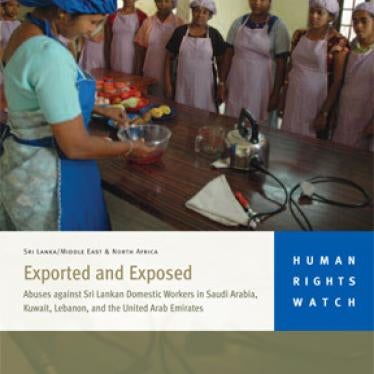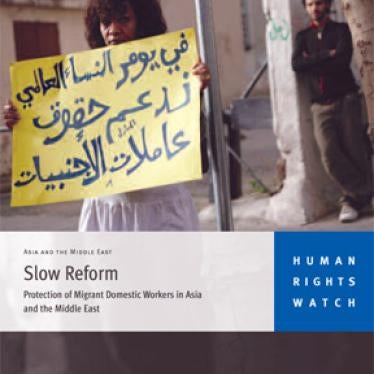As told by Nisha Varia, senior researcher in the Women's Rights Division
Each poster in the ad campaign featured a woman in the uniform typically worn by housekeepers and nannies, complete with ruffled apron. Below the image were facts about abuse of domestic workers. One read: "Have you ever worked for months without pay? Withholding salaries is one of the most common abuses against domestic workers in Lebanon."
Other posters shared equally alarming facts: That 1 out of 3 domestic workers in Lebanon aren't allowed to leave the house alone, or that one-third don't have a regular day off. Another poster focused on the beatings endured by many migrant domestic workers. "Put Yourself in Her Shoes," the posters read at the bottom.
I hoped that this campaign would push people to view domestic workers in different ways. After all, anyone who put themselves "in her shoes" wouldn't tolerate such work conditions.
Millions of women from Asia and East Africa migrate to the Middle East for employment as domestic workers. Our investigations have found that many of these women work up to 18 hours a day, seven days a week, for little pay or even no pay at all. They often face physical, psychological, and sexual abuse. They're denied food and forbidden from leaving their homes. National labor laws often omit domestic workers, leaving them with little legal protection.
Lebanon was no different. But our 2007 report on the ill treatment of migrant domestic workers, Exported and Exposed, did get some media hits in Lebanon. Because of the news coverage, the Beirut-based advertising firm Grey Worldwide offered to create an ad campaign publicizing the issue, at no charge. This, combined with the support of Nadim Houry, Director of Human Rights Watch's Beirut office, made Lebanon look like a solid target for an advocacy campaign on the issue.
Because of this campaign, media coverage and general awareness of the issue has grown tremendously, paving the way for possible change in the laws.
Unlike most Human Rights Watch advocacy campaigns, our main target wasn't just the government. Rather, we aimed to reach Lebanese families, and particularly the women, who oversee migrant domestic workers on a day-to-day basis and who are also their primary abusers.
We hung the posters around Beirut, as well as in smaller cities. We negotiated with magazines and newspapers to place ads for free. Many ran for several weeks in a row. I published an op-ed in As-Safir, one of Lebanon's most-read newspapers.
We created 40,000 fliers and distributed them at supermarkets, where we reached women while they shopped. The fliers asked readers to judge statements about the treatment of domestic workers as true or false. For example, one read: "You should keep their passport, because otherwise they'll run away." In smaller cities, we mailed these fliers directly to people's homes.
One Lebanese woman, who lived in the United States but was visiting her sister in Lebanon, called our office and thanked us for sending the flier, which allowed her to broach the topic with her sister. Other people called, saying things like, "But how can we give them a day off? They'll come back pregnant."
The campaign ignited a public debate and media frenzy, with many mentions in local newspapers, on radio and on television, as well as in regional Arabic-language newspapers and on the television station Al-Arabiyya. We were invited on daytime television - including programs with largely female viewership.
But we had advocacy goals beyond challenging the attitudes of the general public. We wanted local nongovernmental organizations to pick up the fight for migrant domestic workers. And we wanted Lebanon's labor law to protect these women.
At first local women's groups and human rights groups resisted taking on the issue, because they saw the issue as outside their mandate. We encouraged them to think more broadly by drawing parallels to their work. When human rights groups spoke of arbitrary detention, we told them of women trapped in their employers' homes. When women's rights groups talked about domestic violence, we shared stories about domestic workers who were beaten for breaking a plate.
Many of these groups broadened their outlook to include domestic workers. And because of their continued efforts, the issue has not lost traction and we have begun to see results.
In 2008, we published findings revealing that Lebanon's domestic workers were dying at a rate of more than one a week. Often, they died falling from the 4th or 5th story of an apartment building, trying to escape a life akin to slavery.
Four days later, Lebanon's most well-known Shia cleric, Hussein Fadlallah, issued a fatwa, or religious edict, urging employers to stop abusing their workers, saying such actions were religiously forbidden.
In January 2009, the Ministry of Labor introduced a standard contract to protect migrant domestic workers. Just two weeks ago, Lebanon's minister of labor announced at a conference that he would create a telephone hotline for abused domestic workers and hire inspectors to address workers' claims - both actions recommended by Human Rights Watch and other local and international groups.
Our work has extended well beyond Lebanon. Last month, we released a report, comparing government protections for migrant domestic workers in eight countries across the Middle East and Asia.
When we began investigating this issue, almost no one was paying attention to it. Now, this June, labor officials from the world over will discuss it. Members of the International Labor Organization -- including governments, employers' groups, and trade unions -- will work on drafting a convention that will set global labor standards on domestic work.
We began preparing more than a year ago, sending letters to government labor ministers, labor union representatives, and global trade unions, educating government officials on the critical need for strong international standards. We created a brochure and video, and have held public educational events in Geneva and The Hague.
We are holding strategy meetings with trade unions and other NGOs. We have a year of heavy campaigning ahead of us, but we are pleased that of those governments who have publicly shared their position, the majority - including Lebanon -- have indicated that they would support a binding convention that would legally require countries that ratified it to strengthen and enforce their laws protecting domestic workers.
But it's our local research and advocacy - like that in Lebanon - that informs our efforts at the International Labor Organization, where we'll fight for greater rights for these women around the world.







